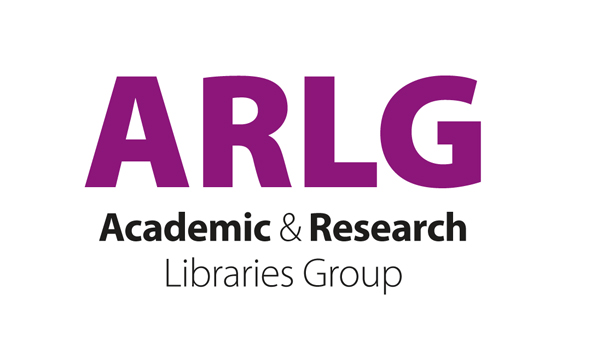For the ARLG Conference 2019, the inaugural Jane Marshall Bursary was available to a librarian or information professional working in a North West FE, HE or research library.
The bursary, in memory of Jane, recognises her dedication and commitment to CILIP Academic and Research Libraries Group, especially her role within the North West ARLG. Jane held a number of committee roles, including Web Officer and Secretary, and represented the North West at national meetings as well as serving on the National Committee. The bursary marks her valued contribution and aims to inspire and encourage others.
The worthy winner of the 2019 bursary was Allyson Watts, College Librarian at Wigan and Leigh College. Allyson said of the conference “as a newcomer to academic libraries being given a chance to meet up with others in the same field; to network and exchange practices and ideas, was what appealed to me”, it was “an invaluable experience that I have learnt so much from.” In this guest post, Allyson elaborates on her experiences at the conference.
When the chance of a bursary came up to attend ARLG conference it was too good an opportunity to miss. Having spent most of my career in public libraries, I am a newcomer to academic libraries so being given a chance to meet up with others in the same field; to network and exchange practices and ideas, was what appealed to me about attending the conference.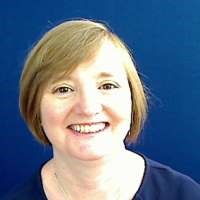
The theme of the conference will resonate with all of us: “Working smarter in a time of change”. David Stewart’s opening speech – “Research, impact and telling the story how they underpin change” highlighted that change is constant and frequent. He stressed that research needs to underpin what we do; it demonstrates our value – using data, feedback and impact. The crucial question we should be asking ourselves is what difference our service makes to the organisational objectives, to the bottom line and to educational achievement.
Katherine Schopflin’s talk on the demise of the media librarian and what we can learn from it, stressed the message that we should not be complacent and we should remember what is unique about our profession. Her key learning points were:
- Just because they love you doesn’t mean you are safe
- Don’t gatekeep
- Don’t become the “Service of gaps”
- A low profile only lasts so long
- Sell what you’re good at
On day 2 Sheila Macneill gave a talk on “A critical, collective community based approach to enhancing digital development in HE”. She stated that information literacy needs to be central to curriculum, not an add on, it plays a critical role in education. It is a driver for digital literacy, enriching digital capability and strategic development.
The final keynote speaker, Lis Parcell from Jisc, gave a talk on “Going with the flow: a digital perspective”. Lis talked about change not always being within our control and how we need to adapt. She asked the question – is working smarter about developing more focus and working more purposefully? The key points that might help us :
- Curiosity – always ask critical questions, challenge what is offered
- Creativity – be creative in spaces, stimulating but know when to stop
- Collaboration – look for opportunities, make connections, have more clarity in communication, make it easy for people to collaborate with you.
The 2 days were interspersed with lightning talks and workshops, which were both informative and enlightening. I attended a short presentation on “UX for free” given by Vee Rogacheva , a UX designer at OpenAthens. She looked at a user centred design framework, which we can all use. This framework suggests we get to know our users – which in some ways is easier for us as they are using our spaces. Learn what our users want and experiment with possible solutions and then finally we implement the solution that is the best fit. Vee highlighted a number of free tools and used slido throughout the presentation to gain feedback.
“To read or not to read” a talk by Middlesborough College staff, looked at the strategies they used to improve reading for pleasure in their college from reorganising their fiction to a book buy with students. The statistics spoke for themselves as they saw a huge increase in borrowing fiction over a year.
This was followed by a lightning talk on “Integrated learner support – supporting the team to support the student” by Cheryl Gardner from University of Northampton. The staff developed a programme of focused support and students had a mandatory set time from the team depending on the level of their course. Level 4 students, for example, had a mandatory 90 minutes – 60 minutes on finding information and 30 minutes on the ethical use of information. Cheryl’s key message is preparation.
I also attended Caroline Ball’s session on Wiki Literacy. They developed a module for a writing and publishing course using Wikipedia to edit and analyse information and to write. Caroline was able to monitor student work using Wikipedia’s educational dashboard. Over the course of the module, students created 6 new articles, edited 112 articles, added 47,000 words and their work was viewed 11.5 million times. They are now planning a module for the history department to improve the local history information on Wikipedia.
As a Marie Kondo fan, I had to attend “Make your statistics sparkle Marie Kondo style”. Anna Semmens used Mentimeter to gain feedback throughout her presentation. Her key points were to think about your audience, who are the statistics for, what do you want the end product to look like, then look at how and what to collect. She started a working group and came up with a template which went through many changes. They combined statistics, simplified them with pie charts, compared month to month, quarter to quarter and added a 1 page SWOT analysis. Although there was staff time invested in arriving at the template the overall effect is that less staff time is used in collecting and publishing statistics.
Ute from OU delivered a session on responding to student information literacy needs. From this they developed a subject showcase youtube video, directing student to the library resources relevant to them. They also developed early bird and night owl training sessions for their students.
I also got the opportunity to visit Teesside University Library, and for those who missed this, they missed a real treat. Spread over 5 floors and themed by the seasons we all came away very jealous. I took so many pictures I cannot possibly share them but will add a few to give you a flavour. The seating varied from floor to floor from booths and bright colour on the summer floor, to cosy armchairs on the winter floor. What the spaces offered was a range of study opportunities and environments for students to choose from.
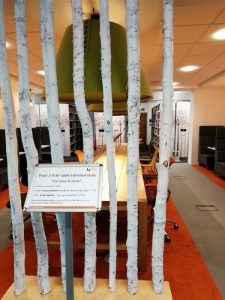
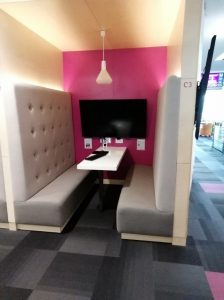
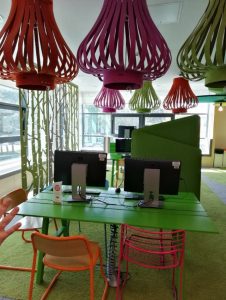
Overall it was a hectic and packed conference. I have taken away so much information it will take me a while to digest it all. The choice of workshops was immense, so I chose those I thought I could get the most out of, but I could have learnt from all of them. From tools presenters were using to ideas shared, I found the two days an invaluable experience that I have learnt so much from.
Originally published on the ARLG NW blog

